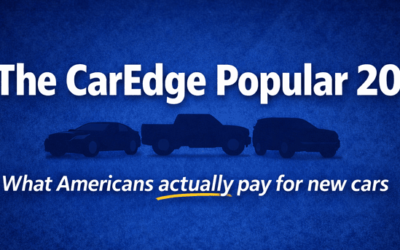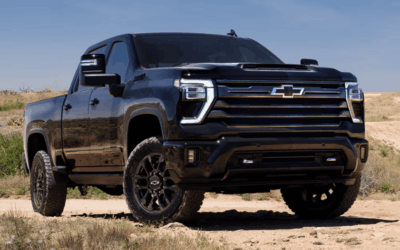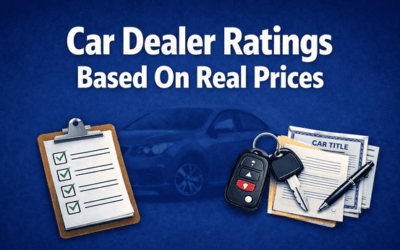You don’t have to look far to see that there is currently something unprecedented going on in the automotive industry. From the empty dealership lots you drive by, to the news stories you’re hearing about a “chip shortage,” it’s clear something very serious is impacting manufacturers, dealers, and ultimately people like you and me; consumers.
We’ve documented in the past how the ongoing semiconductor (chip) shortage is wreaking havoc on manufacturer’s ability to produce new vehicles. Ford is storing F-150’s in country fields and race tracks, Jaguar Land Rover is informing their investors that they’re losing more money than anticipated because of the shortage, and dealers are making record profits because they can sell their limited inventory above sticker price (MSRP).
To suggest that what’s going on in the market right now is ridiculous would be an understatement. We’ve never seen anything like it.
Traditionally, buying a car can be pretty intimidating. You find something online, go into the dealership, sign the paperwork and then you’re left wondering, “did I get a good deal?” In today’s market the answer more and more frequently is “no.”
Become a FREE CarEdge MemberUninformed buyers are agreeing to pay for crazy add-ons, unheard of additional dealer markup, and ridiculous F&I products, simply because they don’t know better. That’s why today we want to share with you the simplest explanation for why you should be leasing a vehicle right now instead of buying it. If you know someone who is thinking about getting a car in this market, please consider sharing this with them.
Here we go …
Why you don’t want to finance a car, truck, or SUV right now
To understand why leasing is the smarter option today, let’s start by explaining why financing (i.e. taking out a loan to purchase) a vehicle is not advisable right now. I wrote about this in depth a few weeks ago, but the long and short of it is this:
Vehicle prices are inflated, which means the loan you take out on the vehicle will be for the inflated purchase price. Let’s say you get a five year loan, well, over the next five years as vehicle prices normalize, you’ll still have your loan for the original amount (when prices were inflated). This means you’ll be in a major negative equity position (the vehicle will be worth considerably less than what you owe on the loan).
Enjoying this guide Check out The Car Buyer’s Glossary of Terms, Lingo, and Jargon
Why is this important? Because in normal times many people would find themselves in $2,000 to $3,000 “negative equity” positions, and that was without inflated vehicle prices at the time of purchase. In today’s market, those same people will find themselves in much more severe negative equity positions because they took out a loan on something that isn’t actually worth as much as it’s selling for right now.
So what options do you have?
Leasing means you don’t own anything, and that’s great
This is where leasing comes into the picture. When you lease a vehicle you don’t own it, you rent it. Leases make a lot of sense in today’s market because they allow you to fulfill your need (having mobility), while also mitigating your risk of taking on debt that will burden you into the future.
Let’s look at a tangible example. Here’s a lease deal for a 2021 Toyota Camry:

You can see the MSRP is $26,701, and the dealership is selling the vehicle at that price. The residual value is down in the bottom left, and it is 52%. That means that at the end of the lease term (36 months and 36,000 miles) the leasing company (Toyota Financial Services) expects the vehicle to be worth 52% of its original value ($13,885).
Should you buy GAP Insurance? Read our guide to GAP Insurance!
The residual value is not negotiable. It is the best guess from Toyota as to what they think the vehicle will be worth at the end of the lease term. Since the pandemic we have not seen meaningful changes in residual values. This makes sense, because the residual value is an estimate as to what the vehicle will be worth in three or four years, not next week. Even with inflated vehicle values today, leasing companies expect their vehicles to return to a normal depreciation curve in the future.
Become a FREE CarEdge MemberBy leasing, you are effectively renting the vehicle for 48% of its depreciation.
Your other option is to finance the purchase of the vehicle. If you do that you will be financing the total purchase price, plus taxes, plus fees. On this Camry deal that likely comes out to $30,000. Typically Camry’s would sell with a dealer discount and significant manufacturer rebates. Obviously in today’s market that’s not what’s going on.
Once used vehicle prices return to normal and this Camry depreciates as expected, you’ll owe significantly more on the loan than what the vehicle is worth. Compare that to our leasing option, and after three years you can walk away from the lease and purchase a Camry then (likely with the dealer discount and the manufacturer incentives we’re accustomed to).
The real benefit of leasing right now is that it means you will not be in a severe negative equity position in three years, and by that time vehicle prices will have normalized as new car supply has returned to normal. At that point it would make much more sense to purchase a vehicle (new or used) since their prices will not be inflated.
In the meantime, if you do finance a vehicle, be prepared to face a sobering reality when you check the value of your vehicle in 24 months. It’s going to depreciate, and if your loan is for thousands of dollars more than what it’s actually worth, that’s going to be a tough pill to swallow.













If we own our car, how do we “trade it in” for a lease, especially considering sales tax implications which can be a few thousand?
From my dad …
In most states sales tax on a lease is collected monthly and based on the monthly payment. So if you have a car that you own outright that you want to trade in on a lease for tax savings, those saving would be limited. What you have is a car to sell and not trade. The implications of trading it would be that most of it’s value would be going to reduce the capitalized cost and making the lease vehicle cheaper for the lease company, but that is money lost if the vehicle were ever declared a total loss by your insurance company.
Treat your trade as a separate transaction and then put down as little as possible on the lease.
I hope that helps,
Ray
I drive about 20,000 miles per year. Is there a situation where leasing would ever make sense for someone like me? My problem is I do need a car very soon but I don’t want to overpay by thousands of dollars. Is my best option a private seller for now?
But what if you’re losing cash in full for the vehicle today?
What if you’re paying cash in full?
Depends on how important depreciation is to you. You have to pay more for a car now, but when the market normalizes the car will depreciate to normal levels. So, for example, rather than 30% in three years, it might be 40% depreciation from what you paid. If you want the best deal while paying cash in full, you should really wait for prices to return to normal. If you need a new car now, get a no money down lease, invest the rest of the cash in a CD for 3 years. Then, when the lease is up you can out right buy that car or purchase a new car with regular discounts that aren’t currently available.
Great up to date article folks! I am still struggling with when to buy or lease something but with your help at least I’ll know I am not wasting my hard earned retirement monies. Thank you for all that you do!
If you intend to buy and hold the car for 10-15 years does this advice still hold up?
NO! If you’re going to buy and hold for that long a period of time, then leasing does not make sense.
Yes. Probably. The reason for leasing now instead of buying is to get you over the hump of low-supply/high-price.
If you pay $3000 too much now, that money is gone forever, no matter how long you hold the car. The question is: is the extra cost of leasing more or less than the $3000. Based on what Ray says, it is better to lease for 3 years to hold off the purchase until prices get back to normal.
You summed up what I was trying to say in about 1/100th the amount of words. Kudos to you!
I re-read the above responses a few times and it seems like conflicting responses. Can you elaborate?
If you are an all cash buyer and plan to hold the car for 10+ years, would you still lease in today’s market?
No, if you plan to hold onto the vehicle for that long purchasing it or financing it makes more sense.
Leasing requires a very high credit score to be considered let alone approved. Is it possible for those of us with low 600 to 700 credit scores to be approved for a lease? If so, which manufacturers would be more amenable to work with such buyers [e.g. for non-luxury or exotic vehicles, like compact or mid-sized sedans] ? Thanks.
From my dad!
Leasing does normally require a better credit history but many captive lenders will approve lease customers with scores in the low 600’s. With that being said, since there is greater risk for the bank the money factor will generally be higher to compensate for that added risk. The cutoff for most lenders is nothing lower than a 600 credit score will be considered.
I think all manufacturers would be willing to consider lower credit scores as long as the credit history is somewhat more established than say someone with a thin or limited credit file. Many F&I Managers can lean on their buyers at most lenders to make an exception when absolutely needed.
There you go sonny boy.
Currently I have a lease, would I benefit from the dealer buy back options? The credit union owns the lease that expires in 5 mos, what do I do about these dealer offers to buy my 2018 Honda CrV, now? I am totally lost here…help!!!
Abby, I am not sure if you are part of the CarEdge Community Forum, but my dad wrote this: https://community.CarEdgemember.com/c/selling-and-trade-in/a-step-by-step-guide-on-how-to-sell-your-leased-vehicle I think that will be very helpful for you.
Gentlemen, what would be your advice on the lease I presently have for a 2017 Hyundai Tucson as the lease is coming to an end. The residual value is about $14,000. What are the pros and cons to consider if I would like to just buy this car? The same cars as a used vehicle are advertised for about $21,000. Does it make sense to buy this vehicle at the residual value?
Mike do me a favor and post this over on the CarEdge Community Forum so that it gets more eyeballs and attention. https://community.CarEdgemember.com/home
Thank you!
Zach , Will do and thank you.
Zach, I am trying to post to the community site as you suggested. But it is asking for a “space” – I assume feedback – it will not post. What am I doing wrong?
Mike the “space” the channel where the post will live. The feedback space is for feedback about CarEdge. I’d recommend posting in the “buying” space.
Zach,
I recently joined the CarEdge community and wanted to say your site and advice is a godsend.
I recently moved back stateside from being stationed overseas for the past 7 years. I soon discovered that this is definitely a crazy time to be in the market for a new/used car. Normally I would buy a car 2-3 years old to get the most value but after considering the market conditions, and reading your article I’m looking at leasing. Thank you to you, your father, and the CarEdge team for providing great tools to car buyers everywhere!
Rj, thank you for the kind words! It’s awesome to know that we are able to help in some small way.
In one your videos you multiplied the money factor by 2400 to arrive at an interest charge (I believe); Why 2400? I leased a VW today; MSRP was around $29,900; I believe they discounted it to $27,050. They showed me a money factor of .00144. I politely asked them to give me their buy rate; they gave me .00074. A tough moment for sure but I had to at least try and ask; the sales person encouraged me to ask for anything and they’d see what they could do. Anyway, no money down, 48 month lease, 10k miles; end of the month on a Wednesday; I ended up getting my lease payments to $351 a month.
Of course as usual you walk outta there feeling like you’re not sure how you did or if you asked the right questions; feels like that every time. They were all nice people and good to work with. Just curious to know if you think this was a good outcome??
Good job getting them to share the buy rate with you. Please consider posting your deal in the “review my deal” channel in the CarEdge Community here: https://community.CarEdgemember.com/c/review-my-deal As for the money factor, take a look at this: https://money.stackexchange.com/questions/39906/why-is-the-money-factor-defined-the-way-it-is
I’m a professional Doordash her and I use my car 90% for business. I want to buy a Toyota Camry Hybrid do you have room for my business as well as save money on gas. My own personal bank is willing to give me a commercial loan for the car. I put on a lot of mileage should I consider leasing still? And then just buy the car out right at the time?
Would it be smart to lease to own? We have done that in the last….so if we are planning on buying car at the end of the lease is it smart to put money down on lease to make pymt lower?
Why do you recommend NOT putting a down payment on a lease to lower payments? Doesn’t that just subtract from what you’d otherwise have to pay on a monthly basis, resulting in less interest paid over the lease period?